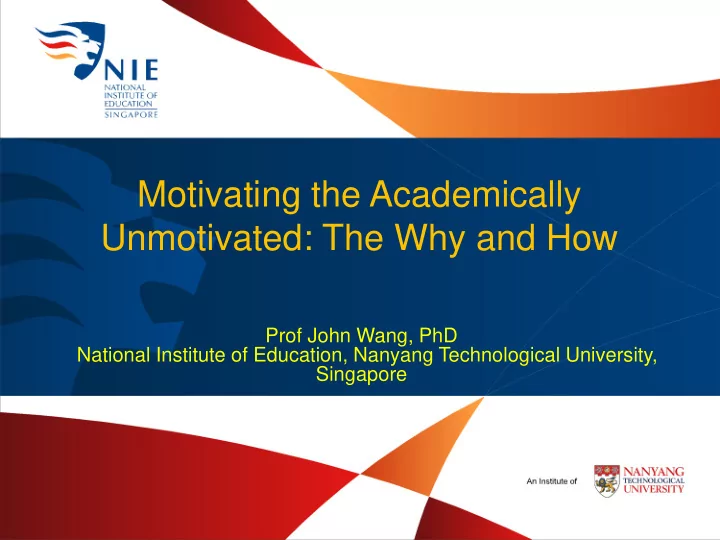

Motivating the Academically Unmotivated: The Why and How Prof John Wang, PhD National Institute of Education, Nanyang Technological University, Singapore
Overview of Presentation Define motivation Overview of the three theoretical frameworks sport ability beliefs achievement goal theory self-determination theory Research Findings
Understanding Motivation Persistence Direction Intensity Persistence over time Performance
Study of Motivation Theory Y Theory Z Theory X
Sport Ability Beliefs Dweck & her colleagues (Dweck & Leggett, 1988) proposed that theories of intelligence that people hold create different goals. Mastery Goals
Sport Ability Beliefs
Biddle et al., 2003 0.857 0.832 Learning 0.515 Task Incremental 0.555 0.463 0.861 Improvement 0.126 0.508 Enjoyment 0.772 Stable 0.842 0.636 Entity Ego 0.264 0.771 Gift 0.964 0.637 χ 2 = 815.49, df = 343, NNFI = 0.915, CFI = 0.921, RMSR = 0.065, RMSEA = 0.047
Sport Ability Beliefs Entity beliefs do not allow feelings of confidence and control over future outcomes, especially when perceived competence is low, thus resulting in less adaptive responses. Incremental beliefs, through the pursuit of task goals, allow the feeling that success is under one’s personal control (Duda & Nicholls, 1992; Nicholls, 1989), resulting in more adaptive motivational patterns. It is apparent that looking at self-conceptions of ability or beliefs is useful in understanding students’ motivation in physical activity settings.
Achievement Goal Theory Nicholls’ AGT (1989) assumes individuals strive to demonstrate competence and avoid showing incompetence.
Achievement Goal Theory Predictions: Goal Orientation Perceived Ability Behaviour Pattern Ego/Performance High Adaptive Ego/Performance Low Maladaptive Task/Mastery High or Low Adaptive
A 2x2 Achievement Goal Definition Mastery Performance Mastery- Performance- Approach Approach Approach Valence Mastery- Performance- Avoidance Avoidance Avoidance
Wang, Biddle & Elliot 2007 1.5 1 0.5 Moderate Z Score 0 Low High Mastery -0.5 -1 -1.5 Clustering Variable
Wang, Biddle & Elliot 2007 1 0.5 Z Score 0 Moderate ENJOY EFFORT BOREDOM PA Low High Mastery -0.5 -1 Outcome Variable
Wang, Biddle & Elliot 2007 1 0.5 Cluster 1 Z Score Cluster 2 0 Cluster 3 RAI AMOTIV RELATED PCOMP Cluster 4 -0.5 -1 Psychological Variable
Self-Determination Theory According to SDT, people are active organisms seeking to master their internal and external environment (Ryan & Deci, 2008). Three psychological needs are essential conditions for self- growth, integrity and well-being. Goals pursuit are driven by psychological needs. Competence Relatedness Autonomy Goal Pursuit
Self-Determination Theory Int Events Ext Events Needs Needs Satisfied Thwarted Intrinsic Intrinsic Motivation Motivation Task Ego
Self-Determination Continuum: Amotivation Intrinsic Extrinsic Motivation Motivation Non-regulation External Introjected Identified Integrated Intrinsic Regulation Regulation Regulation Regulation The self-determination Continuum -- -- - + ++
Recommend
More recommend